Heat pumps are suitable for all homes and are becoming more of a deciding choice for our customers who are looking to lower their energy usage.
Is my home suitable for a heat pump?
_image_640w_213h.jpg)
What is a heat pump?
Heat pumps use the unused heat stored in the air, ground or water to heat your home or business.
The three types of heat pumps available:
Deciding which heat pump is the most suitable option will likely depend on your home location and surrounding environment. They operate using either the air, ground or water sources to generate hot water and heating for your home, with 75% of the energy they use being generated entirely by their surrounding environment (and the further 25% by your household electricity supply).
If you need more information about how heat pumps work, please visit our guide to ‘How does a heat pump work’. You can also check out our video here for more information:
Is my home suitable for a heat pump system?
To get the full function of a heat pump, you need to consider the following specification to ensure it is cost effective and it is operating well to reduce your carbon footprint.
-
Home Insulation
Insulation helps your home retain heat, whilst preventing it from being lost through walls and ceilings. Therefore, taking the necessary steps to properly insulate your home ensures your heat pump is operating efficiently. Modern windows will also go further to minimise heat loss, and better for the environment. Although they can run at low temperatures, having a well insulated home will increase its overall efficiency and help to reduce running costs and to save on your energy bills.
-
Poorly insulated homes
If your house isn’t well insulated, you would need a larger heat pump to manage the loss of heat (although this may affect your eligibility to apply to the Boiler Upgrade Scheme). Sometimes, a heat pump may not be suitable for homes and can be more costly to run than your existing setup. If you're still looking for a sustainable solution, you could opt for a hybrid heating system which uses a gas or oil-fired boiler alongside a heat pump. Please note, your hybrid heating systems may not be covered by the Boiler Upgrade Scheme.
We also recommend checking the following and making the necessary installations if needed:
- Check if you need a cavity wall and loft insulation
- Check if there are any cracks around exterior doors and your windows if you have double glazing
A qualified and MCS-certified heat pump installer will assess your property and advise if any changes need to be made to ensure your new heating system delivers maximum efficiency and performance for your home.
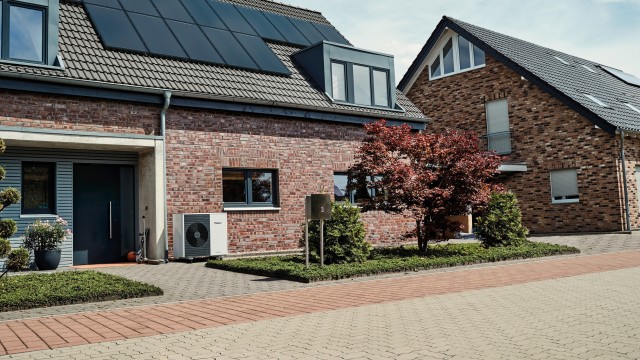
How much outdoor space do you have?
Depending on the type of heat pump system you want to install, you will need to consider where you will put it and if the chosen area is suitable.
Different types of heat pumps
Heat pumps are an innovative way to efficiently heat your home. From air-source to ground-source, each type is tailored to meet different heating requirements.
Best Location: Front or back garden, large outdoor wall space
Air source heat pumps are easier and less disruptive to install. The outdoor unit collects thermal energy from the air and converts it into usable energy to provide heating and hot water for your home.
The outdoor unit needs sufficient clearances from openings such as windows and doors. Your installer will advise the best position at your property. You will also need space inside your home for an indoor unit, hot water cylinder, and control that maximizes the heating and hot water comfort levels of your home.
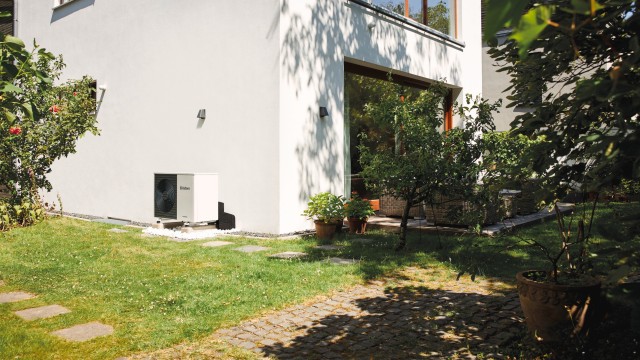
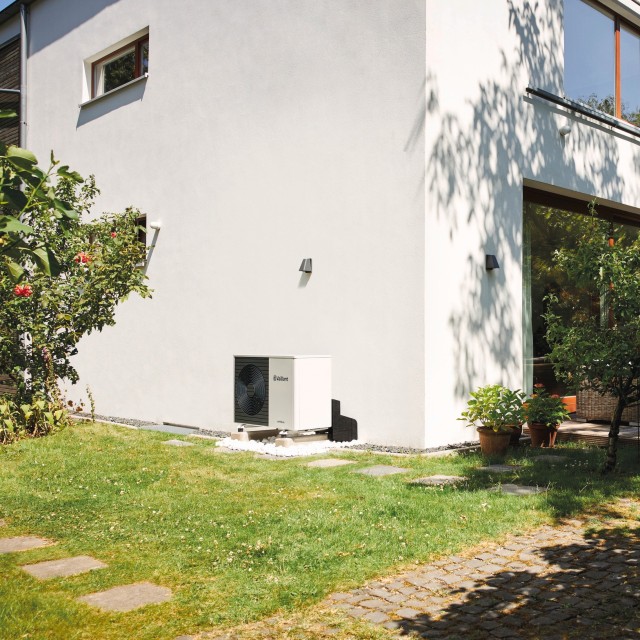
Best Location: Large Garden
If you choose a ground source heat pump you will need sufficient outdoor space for it to be placed. They often take longer to install because of additional groundwork required for the heat collectors.
Larger gardens can accommodate a ground loop where horizontal pipes are laid in trenches. The ground will need to be free from trees as roots will cause problems when digging. If your garden space is smaller, boreholes will need to be dug for vertical pipes to be installed deeper in the ground.
A ground survey will be required for this type of installation. The size depends on the energy requirements of your home; typically they are 100m deep. You will also need space inside your home for an indoor unit, hot water cylinder, and control that maximises the heating and domestic hot water comfort levels of your home.
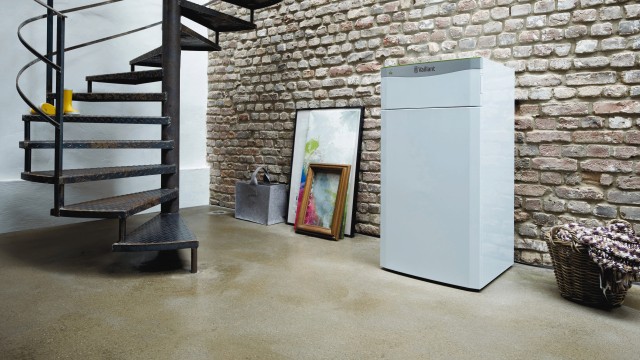
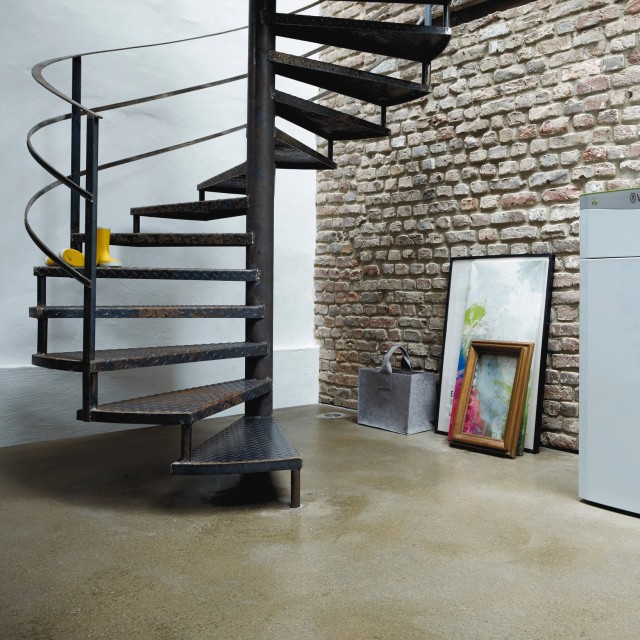
Best Location: Large water area in-front or behind your home
Water source heat pumps offer an efficient energy solution for properties that are close to a body of water. They work by extracting heat from a lake, river or stream and turning it into energy that can be used to heat your home and supply with hot water.
The installation location of the low noise outdoor unit requires careful considerations as it must be close to the water source for the extraction pies to be connected. The installer will advise you of any planning considerations during the pre-installation site survey.
Like air source, you will require space for the internal unit.
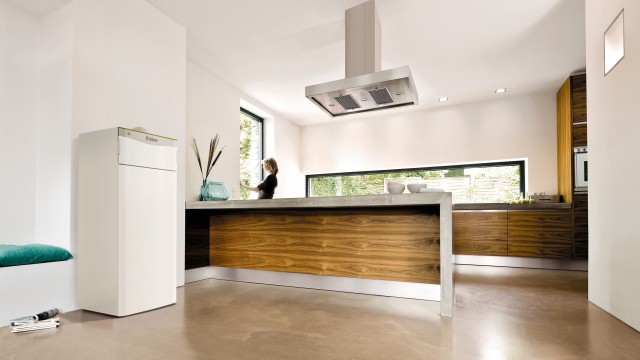

Watch our video 'heat pumps and efficient operation'
The Boiler Upgrade Scheme (BUS)
The Boiler Upgrade Scheme was announced as part of the Government’s Heat and Buildings Strategy and is open to all eligible domestic property owners in England and Wales.
The aim of the scheme is to reduce the cost of installing low carbon heating systems to encourage more homeowners to move away from fossil-fuel based systems.
Dependent on your suitation, you may be able to claim the following:
- £7,500 off the cost and installation of an air source heat pump
- £7,500 off the cost and installation of a ground source heat pump (including water source)
- £6,000 off the cost and installation of a biomass boiler
Discover more about the BUS by clicking here.
If you live in Scotland, there is different funding available for having a heat pump installed. To learn more about the Home Energy Scotland (HES) grant, click here.
Still got questions? We've got the answers
-
How much electricity does an air source heat pump use?
Heat pumps generate most of the energy that they require from the environment around them. They can produce 3kW of heat for every one kW of electricity used, making them highly efficient in heating your home and delivering hot water comfort.
-
Why is my air source heat pump expensive to run?
A poorly insulated home will cost more to run as the heat pump will have to work harder to compensate for the escaping heat from your home. Regular maintenance is also key to ensure your heat pump is optimally performing and the fan is free from leaves and debris that could potentially affect the output.
-
How powerful are air source heat pumps?
The heating outputs of air source heat pumps range from 3.5kW to 15kW.
-
Do air source heat pumps offer cooling?
The aroTHERM plus is designed to deliver comfort all year round, offering both heating and cooling capabilities. To enable the cooling function, you’ll need to add the Vaillant cooling module—a specific accessory that transforms your heat pump into a cooling system. This means you can enjoy cosy warmth and a cooling functionality in the winter months, all with one efficient solution.
If you’re interested in cooling for your air source heat pump system, please speak to your installer.
-
How much does it cost to install a heat pump?
Your installer will give a quote for the work that needs to be carried out during the consulation stage. According to the Energy Saving Trust, air source heat pumps can cost £14,000. However, there is support available through the Government's Boiler Upgrade Scheme (BUS) where you can get a grant of up £7,500 to support with installation costs.
However, there are a few factors you need to consider ahead of installation which could affect the cost. This includes what type of system you have installed, the size of your property, whether its a new build or being retrofitted in and how much work is required to adapt your home ready for a heat pump.
-
How much indoor space does a heat pump system require?
Heat pumps require sufficient space inside your home for the indoor components. For air source heat pumps, you will need a hot water cylinder and depending on your system, a buffer tank.

